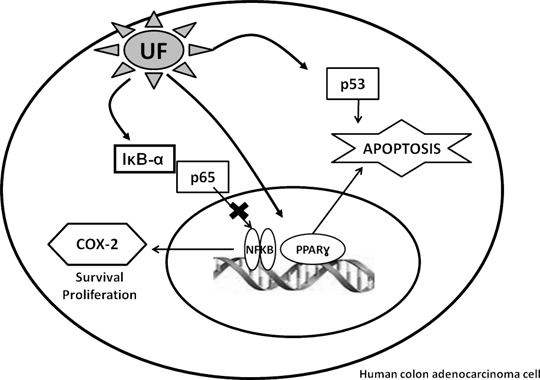Mechanisms involved in the antiproliferative and proapoptotic effects of unsaponifiable fraction of extra virgin olive oil on HT-29 cancer cells Background: Extra Virgin Olive Oil (EVOO) has demonstrated a great functional versatility related to its oncostatic and anti-inflammatory properties. Although traditionally, many beneficial properties has been ascribed to its high monounsaturated fatty acid (MUFA) content, nowadays, it is clear that many of the EVOO beneficial effects may be due to its minor components present in the unsaponifiable fraction (UF). Aim: In this study we evaluated UF of EVOO effects in HT-29 human colon adenocarcinoma cells and characterized whether UF-mediated cell growth inhibition was accompanied by induction of apoptosis as well as the action mechanisms involved in its potential proapoptotic effects. Cell growth and viability assays were determined by SRB test at different time points (24, 48 and 72h). Methods: The proapoptotic effect was evaluated by flow cytometric studies. The protein expression was determined by immunoblotting. Results: 250 and 500 µg/mL of UF caused significant reduction in the growth of HT-29 cells after 24 and 48 h (P <0.05 and P <0.01 vs. DMSO control). The number of early and late apoptotic cells increased significantly in presence of 500 μg/mL of UF (P<0.05 vs. DMSO control). A significant downregulation of proinflammatory COX-2 (P<0.05 vs. DMSO control) and an up-regulation of proapoptotic p53 (P<0.05 vs. DMSO control) proteins were observed in 500 µg/mL UF-treated cells. Similarly, 250 and 500 µg/mL UF treatment caused a significant stimulation of PPARγ protein expression (P<0,05 vs. DMSO control ) and 500 µg/mL prevented the IKβα protein degradation (P<0,05 vs. DMSO control ) on human HT-29 cells. On the contrary, no significant changes in phosphorylation levels for p38 and JNK MAPK pathways were observed after UF treatment. Conclusion: Our findings suggest that UF of EVOO could play an important role in the anticancer effect of virgin olive oils and probably may provide a basis for developing natural sources of chemopreventive and chemotherapeutic agents for the treatment of human colon cancer. 
|

